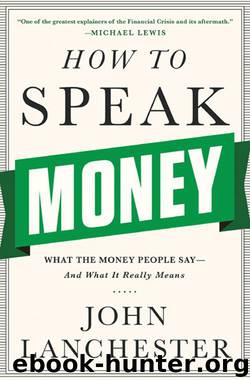How to Speak Money: What the Money People Say-And What It Really Means by John Lanchester

Author:John Lanchester
Language: eng
Format: mobi
Publisher: W. W. Norton & Company
Published: 2014-10-05T14:00:00+00:00
One of the places where hollowing out can be seen most clearly is in the English countryside. I was in a pretty corner of Sussex last summer, outside a village photogenic enough to be the backdrop of a TV murder mystery, passing through a landscape that looked as if it had been unchanged for two hundred years—all while the friend with me, who lives there full-time, explained that the image of stability and continuity was entirely illusory. The larger houses were lived in by hedge funders who spend three nights a week in London, the smaller houses by City workers who commute, and the fields that once provided the livelihood for hundreds of people, once the raison d’être of the village, now employed one person full-time, and were owned and rented out by a hedge fund manager. The picture was more or less the same; the underlying reality was wholly different. That’s hollowing out.
hot money Money that moves around the world in search of profit, irrespective of all other considerations. Last week, commodities; this week, London property; next week, Nigerian banks. The sudden movement of hot money has been a crucial factor in every national economic crisis of the last twenty-odd years—the Mexican and Asian and Russian meltdowns of the nineties, the Icelandic and Spanish and Irish crises of the noughties, and so on. As the world economy has gradually opened up and deregulated and grown more interconnected, hot money has become an increasingly prominent feature of its operations. It’s an important item of faith in mainstream economics that the completely free movement of capital benefits everybody, and the system is certainly designed to act on that faith: international movements of capital have grown from about 60 percent of GDP to more than 450 percent in the last twenty years. The trouble is that while the downsides of the rapid movement of hot money are clear when a crisis hits, nobody has been able to prove a clear benefit to the ordinary citizen of this free flow across borders of multiple trillions of dollars. It’s also the case that the country whose economy has grown more rapidly and more sustainedly and has transformed more lives than any other, China, doesn’t permit the free flow of capital across its borders.
hot waitress index One of several fanciful techniques for predicting the direction of the economy. Some of them are genuine attempts at working out which way things are going by looking at wider social trends: one of them is the idea that skirts get shorter during boom times, presumably because people feel frisky. Some of them are so obvious they hardly need stating: the better the economy in an area is doing, the harder it is to find a taxi, or the more cranes you see when you look out the window. Well, duh. The hot waitress index is a joking variation on that: it suggests that the better an economy is doing, good-looking women get better and better work—what the girls in Lena Dunham’s Girls refer to as “pretty girl jobs,” as gallery receptionists and suchlike.
Download
This site does not store any files on its server. We only index and link to content provided by other sites. Please contact the content providers to delete copyright contents if any and email us, we'll remove relevant links or contents immediately.
International Integration of the Brazilian Economy by Elias C. Grivoyannis(110319)
The Radium Girls by Kate Moore(12018)
Turbulence by E. J. Noyes(8040)
Nudge - Improving Decisions about Health, Wealth, and Happiness by Thaler Sunstein(7693)
The Black Swan by Nassim Nicholas Taleb(7109)
Rich Dad Poor Dad by Robert T. Kiyosaki(6612)
Pioneering Portfolio Management by David F. Swensen(6289)
Man-made Catastrophes and Risk Information Concealment by Dmitry Chernov & Didier Sornette(6007)
Zero to One by Peter Thiel(5787)
Secrecy World by Jake Bernstein(4741)
Millionaire: The Philanderer, Gambler, and Duelist Who Invented Modern Finance by Janet Gleeson(4469)
The Age of Surveillance Capitalism by Shoshana Zuboff(4279)
Skin in the Game by Nassim Nicholas Taleb(4239)
The Money Culture by Michael Lewis(4198)
Bullshit Jobs by David Graeber(4179)
Skin in the Game: Hidden Asymmetries in Daily Life by Nassim Nicholas Taleb(3992)
The Dhandho Investor by Mohnish Pabrai(3759)
The Wisdom of Finance by Mihir Desai(3735)
Blockchain Basics by Daniel Drescher(3574)
